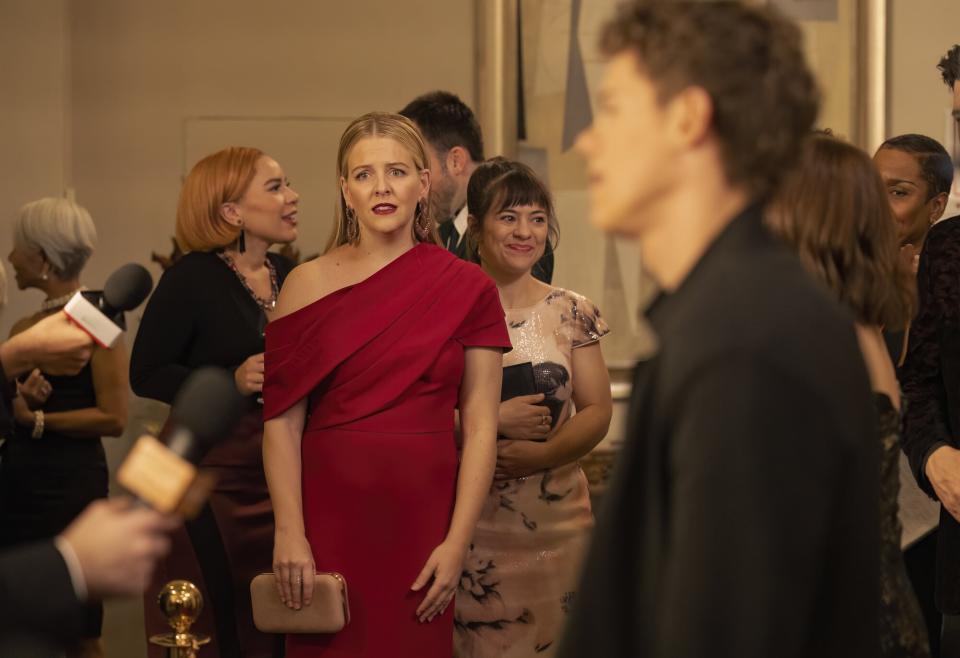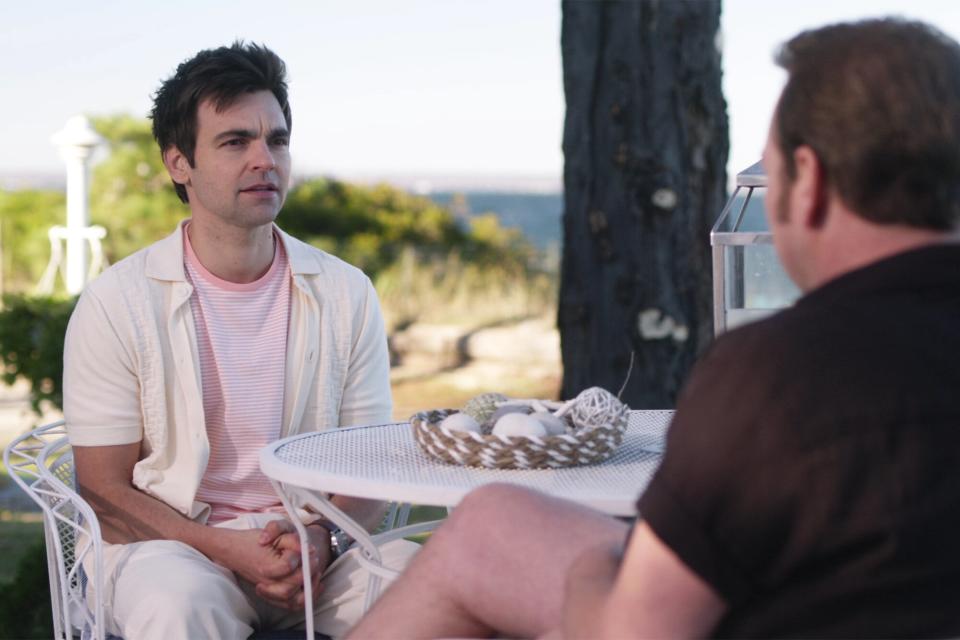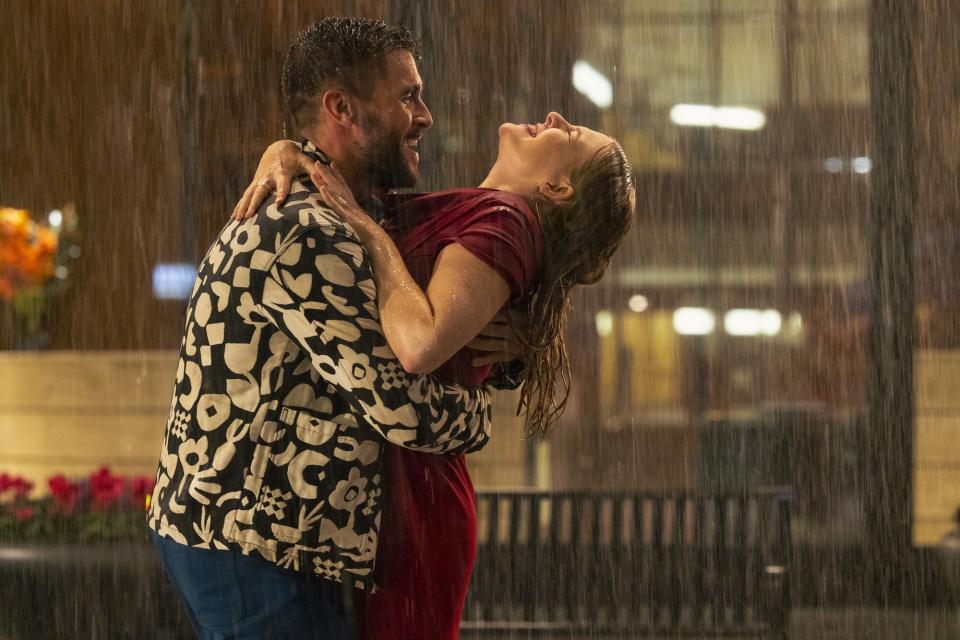The Other Two stars break down series finale ending: 'It's a release'
- Oops!Something went wrong.Please try again later.
Warning: This article contains spoilers for The Other Two season 3 finale, "Brooke & Cary & Curtis & Lance."
As Brooke Dubek (Heléne Yorke) would say, The Other Two "did good" in the end.
The season 3/series finale (streaming now on Max) ended with both Dubek siblings having life-changing realizations and putting others before their own careers — maybe for the first time ever. Brooke took the fall for all the public hate ChaseDreams (Case Walker) and Pat (Molly Shannon) were getting, fired herself as their managers, and even gave up her dream of winning a Peabody Award. Meanwhile Cary (Drew Tarver) turned down his shot at a potential Academy Award-winning starring role to take a break from acting and be a better family member/friend to everyone in his life. Brooke made amends (and made up) with Lance (Josh Segarra), while Cary apologized to Curtis (Brandon Scott Jones) and started the long journey toward fixing their friendship.
Things were really looking up for the Dubeks ... but of course, the more things change, the more they stay the same. The final scene revealed that Brooke's selfless actions for her clients actually made her the most in-demand manager ever, and her hard-earned lesson of doing good instantly became: "It's good to be bad."
Below, The Other Two stars Yorke and Tarver break down what that series finale ending means for their characters, finally getting to see Brooke and Cary get what's been coming to them after three seasons, and more.

Max Heléne Yorke on 'The Other Two'
ENTERTAINMENT WEEKLY: This season has been way more dramatic and emotional than the previous two. What was that like for you, bringing these darker, heavier, and wilder stories to life?
HELÉNE YORKE: I couldn't believe the lengths that they went to, how absolutely insane it gets.
DREW TARVER: It was really cool, because we've set up these characters over the first two seasons and there have been moments where it got bigger, the swings that we were taking were bigger, but this season we really went 100 miles an hour at what was already set up. We were taking big swings, but it felt like we had set up a foundation to go wild with. It was really fun to take it to 100 miles an hour with that sort of grounded base.
YORKE: Drew is right on by saying that we've built these characters over two seasons, and in a lot of ways I think they earned it. It's a release for both Brooke and Cary to have those big, cathartic hard realizations and moments. It is so rare that you can be on a comedy and do scenes where you're crying and totally falling apart. It speaks to our creators, Chris Kelly and Sarah Schneider, who know that storytelling is dynamic and that comedy is dynamic. They definitely went from hard physical insanity into real drama moments. That's a hard pivot to do, and they pulled it off.
TARVER: You're trying to find what makes these characters tick or why they keep getting in these really terrible situations, and there's a truth and an emotion to it, and eventually they're going to have to face it. If the characters are going full speed, they're going to hit a wall, and it is very fun to play the other side of the comedy. You don't just have to do a comedy for 30 straight minutes. It's a safe place to come in and do that type of stuff because you know the creators have you. I felt very safe, and opposite Heléne, she's a great dramatic actress as well, so going there with people who can do both was less scary for me.
YORKE: I think it's also universal that anybody who's a nightmare is deeply unwell with themselves.

Max Drew Tarver on 'The Other Two'
TARVER: Yeah. And then you get to see, okay, take the jokes out of this nightmare person. What's wrong with them? How do they sit in quiet? What does that look like? Here comes the truth.
YORKE: One of my favorite moments this season is after Drew's musical number. It really shook me to my core watching it. He's singing, and then it's just bone silent as he turns his car on and drives out of the parking lot. It's so long, it's edited so well. He's in the quiet car for so long and it's devastating. It's a devastating drop off of something so ridiculous.
TARVER: That was the last thing I filmed this season, the final shot. We filmed this whole season and there was an element of truth to, like, "Drew, go drive quietly in the car for four minutes." That was the end of filming for me, so it was very fun to have that kind of mimic the excitement that I was feeling, but the quiet that was going to come after "cut." But I'm gunning for Heléne's Broadway career. My falsetto, I don't know if it's there yet, but we're working on it.
YORK: It's pretty good, Drew. I was like, "Did they autotune this motherf---er? He sounds good."
TARVER: I recorded that in LA when we were on a break. We did a bunch of warm-ups before, and I've never warmed my voice up. And then the more I sang, the better I got at it. I was hitting notes I've never hit before. Afterwards, my voice was so warm and none of my family was in town, so I was leaving my family voice notes being like, "Listen, I can sing!" So I can sing, but it only takes three to four hours of me warming up, and then I'm only good for 42 minutes and then it's done.
After an entire season of buildup, Brooke and Cary finally have their own individual come-to-Jesus moments in the finale. What did you think about how they ended this season?
YORKE: I mean, she lights a building on fire in [episode] 9, so I was like, "What's 10 going to be?!" Where's the wall? They just kept climbing up and up and up. They went to space, literally, and then dropped us from there. It's so gratifying and rare to be given the opportunity to do it, and that's, for me, the biggest takeaway of season 3.

Max Josh Segarra and Heléne Yorke on 'The Other Two'
TARVER: You think they're going to learn a lesson. For Cary, every episode, at the end of it, somebody says something to him that he should hear and take a lesson from, and the last line of the episode is him just not learning the lesson. He's not hearing anything. That was such a fun ratchet up that I knew we were going to get dropped from. And when I read the finale, it did feel super gratifying. I think Cary does have some instincts that are good inside of him somewhere, after every episode doubling down and choosing the wrong path and getting so far out, it was very nice to get to have him make a smart decision or to slow down or to take a second to think about something instead of just throwing himself into further disarray. It was a really nice ending to bring this character back to reality.
YORKE: Something that people tell us all the time that they find surprising about our show that they like is that it's a story about a family and at the heart of it, it's people who love each other. That's, for me, what the end of season 3 really was a reminder of — they took Brooke to her edge, but then when it came time to defend and stand up for her family, she does it without even having to think twice.
Was there ever a moment this season where you were worried that Cary and Brooke went too far, and there was no redeeming them?
YORKE: [Laughs] Yeah, burning down a building.
TARVER: What's fun about the show is you could point to things in so many episodes where you're like, "That's it for her," or "That's it for him," or "I'm done with that character." But then we ground this and take the audience to where they will somewhat relate to this character, in how lost they've gotten. There's a really fun challenge in that: "I'm going to work really hard to bring this character back to life despite them operating on their worst instinct for like five straight episodes." Fans want to see these characters get a full reckoning or a comeuppance, and I'm excited for them to see that building frustration that they probably have toward all this bad behavior come to an end.
YORKE: I hope people are touched and feel resolved and are satisfied with where they end up because it's not what you would expect. We treat these characters with respect and with deference the way that I think we should all think about treating ourselves a little bit more. You could have a full reckoning, go to jail, get exactly what you deserve, have nobody talk to you ever again, but nothing is irredeemable and none of us are irredeemable.
TARVER: They're always kind of swapping places but learning. They're behind each other or in front of each other in different journeys, and it's an interesting dichotomy of them both learning something but being in different places in the industry.
Sign up for Entertainment Weekly's free daily newsletter to get breaking TV news, exclusive first looks, recaps, reviews, interviews with your favorite stars, and more.
Related content:

